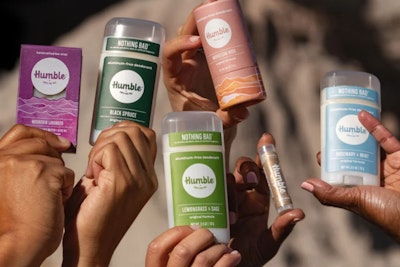Humble Brands
Aluminum-free deodorant and personal care

Humble Brands' Sustainability Rating
Fair
Ingredients
Humble Brands has made ingredient commitments to lower its environmental impact, including by avoiding parabens and phthalates, and prioritizing EcoCert COSMOS biobased ingredients. Commons didn't find evidence of environmentally-harmful ingredients such as parabens, phthalates, other petrochemical-based ingredients, uncertified palm oil, PFAS, or microplastics in this brand's products. This is difficult for many brands to achieve. Its products incorporate biobased, organic, and upcycled ingredients. It carries products that have certifications from Leaping Bunny.
Containers & Packaging
Humble Brands doesn't appear to have made any efforts to minimize its containers, which increases shipping emissions and packaging volumes. It has made efforts to reduce virgin plastic in its packaging, by offering biodegradable plastic-free containers for its bestselling products and using recyclable paper-based shipping materials. It uses 75% recycled plastic for products that still have plastic containers.
Energy & Water Use
Humble Brands shares brief information on its energy strategy. It uses enewable energy to power its production sites and corporate offices, but it doesn't detail the volume or proportion, and it doesn't have any stated targets for expanding its renewable energy. Humble Brands has an unknown production span. It doesn't provide information on any water conservation strategies.
Refill & Reuse
Humble Brands doesn't offer any reusable containers or a takeback program to further help avert waste.
Slow Cleaning
Humble Brands doesn't frequently release seasonal or new products, which helps prevent production of excess inventory.
Marketing
Commons is still evaluating this brand's marketing emails.
Transparency & Reporting
Humble Brands has a prominent sustainability page with details on its climate strategy. Humble Brands shares a complete list of ingredients used in its products, overall and on a per product basis.
Emissions Tracking
Commons couldn't find information on this brand's emissions tracking.
Targets & Offsets
Commons couldn't find emissions reduction targets for this brand. Commons couldn't find evidence that this brand offsets any emissions.
Supply Chain & Labor
Humble Brands publishes very limited information about its supply chain partners. It doesn't publicly share a supplier code of conduct. Humble Brands doesn't have a stated policy of regularly auditing its supply chain partners. This may increase human and environmental risks.
Advocacy
Commons wasn't able to find evidence of any trade association memberships or any relevant policy for this brand. Humble Brands isn't a member of any key advocacy organizations that are blocking climate policy, but it also isn't a member of advocacy organizations advancing climate policy. It doesn't employ any state lobbyists and didn't donate more than $100k to climate-obstructive candidates or PACs from 2018-2024.
Humble Brands is rated Fair because it has improved its ingredients and packaging, but still has room to grow and share more.
Humble Brands has succeeded in its commitment to avoid select ingredients that pose a threat to the climate, including parabens, phthalates, and uncertified palm oil. Commons didn't find evidence of these or other environmentally-harmful ingredients in its products, such as PFAs, microplasticsm, or other petrochemical-based ingredients. This is a difficult accomplishment for a small brand. Humble Brands has made efforts to reduce its packaging plastic use and waste, and it offers bestsellers in biodegradable paperboard containers and uses 75% recycled plastic for other products.
However, Humble Brands doesn't offer any reusable containers or a takeback program to reduce its waste and emissions footprint. Though it's a small company with likely limited resources, we hope it provides more transparency around its energy strategy, emissions, and supply chain labor practices in the future.
Our ratings are based on a scale from 1 (harmful) to 5 (best). How we rate →
https://humblebrands.com/pages/faq
https://humblebrands.com/pages/deodorant-formula-guide
https://humblebrands.com/collections/all/products/palo-santo-frankincense-natural-deodorant
https://humblebrands.com/pages/impact
https://humblebrands.com/pages/ingredients
https://fminus.org/lobbyists/
https://www.fec.gov/data/browse-data/
Get Rewards
Earn for sustainable purchases
Commons rewards you for sustainable purchases from all our Top Rated brands, plus thousands of everyday purchases — from thrift stores to public transit.
Learn more about rewards ->







